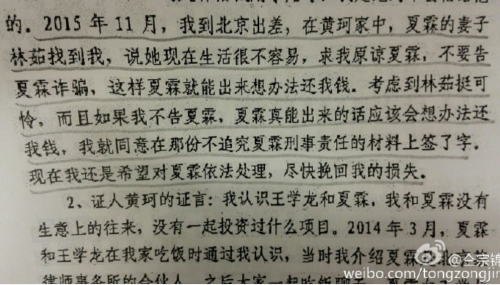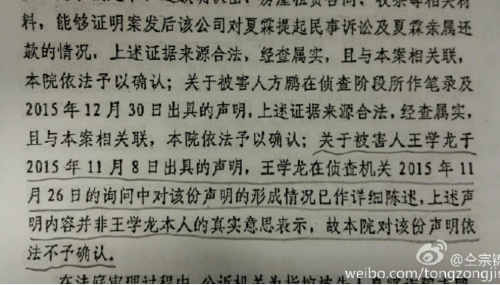The following post by Hu Nanjie (胡南街), a user from Shanghai’s Huangpu District with more than 800 followers, was deleted from Weibo sometime before 5:50PM Hong Kong time on Thursday, September 22, 2016. The post comments on the sentencing of lawyer Xia Lin (夏霖) to 12 years in jail for alleged fraud, a case that prompted alarm from many human rights advocates.
Xia Lin has represented a number of high-profile clients, including the artist Ai Weiwei (艾末末) and the human rights lawyer and former CMP fellow Pu Zhiqiang (浦志强). Xia’s own Weibo account, which has just under 19,000 followers, has not been active since August 2014. He was arrested for alleged fraud in November of that year.
The post from Hu Nanjie in Shanghai read:
Xia Lin, born in 1970 in Guizhou, a renowned lawyer. He has represented many sensitive cases, including the case of [migrant worker] Cui Yingjie (崔英杰), who murdered an urban management officer, the case of Ai Weiwei, and the case of Pu Zhiqiang. In November 2014, because he was the defence in the Guo Yushan (郭玉闪) case, which involved Occupy Central, he was taken away by police on charges of fraud. When Xia represented the Deng Yujiao (邓玉娇) case, he wept bitterly for what she had faced, and for the utter lack of conscience. Today, he has been sentenced to 12 years! And who will cry injustice for him?
The original Chinese-language post follows:
夏霖,70年生于贵州,知名律师。他代理过多起敏感案件,如崔英杰杀城管案,艾末末案,浦志强案。2014年11月,因担任郭玉闪辩护人,涉及占中, 被警方以诈骗罪从家中带走。夏代理邓玉娇案时,曾为她的遭遇痛哭,高呼丧尽天良。今天,他被重刑12年!谁来为他鸣不平?

Searches for “Xia Lin” on Weibo today, September 22, 2016, do return results. These posts tend to be straight reports of the verdict, comments supporting the decision, criticism of Western meddling in China’s affairs, or remarks drawing from Xia’s case lessons about the ills of gambling.
But there certainly are posts, like this one, that continue to raise questions about various legal aspects of the case. One question surrounds claims from Wang Xuelong (王学龙), the key plaintiff in the case, that he loaned money to Xia Lin’s wife, Lin Ru (林茹), out of sympathy for the family’s desperate circumstances, but on Lin’s condition that he formally declare no intention to seek criminal responsibility should Xia Lin be unable to repay the money.
On this question, Tong Zongjin (仝宗锦), a Harvard-trained professor of law with more than 100 thousand followers on Weibo, writes:
Looking at the verdict in the Xia Lin case, I deeply feel that the reasoning is coarse and crude. Let me try to give an example. The first image below says that the person [allegedly] harmed, Wang Xuelong, signed at Lin Ru’s request a statement that he would not seek criminal liability from Xia Lin. Then now he still says he hopes that Xia Lin can be handled in accord with the law and that he can quickly recover his loss. The second image is the court’s determination that the statement in question is not authentic, which is to say it is not admitted. The problem is: first of all, by saying that [he] hopes to handle this according to the law, quickly recovering [his] losses,” does this mean changing his previous statement [to Lin Ru]? So does handling in accord with the law mean pursuing the charge of criminal fraud? Secondly, concerning the authenticity or not of the statement, the court should also explore whether misunderstanding, fraud, coercion, deception or other specific motives were involved [on Wang’s part]. Looking that these images [of the verdict], it is clear that Wang’s sympathy and agreement not to pursue criminal liability helped induce acceptance of the funds. How can [he] now say that at the time he was not being true? Thirdly, when its clear that the parties involved had already come to an understanding, why is there a need for you, the investigating organs, to summon people and provide fresh evidence to support criminal accusations, saying that yesterday doesn’t matter and today does?
























